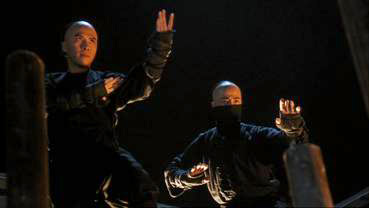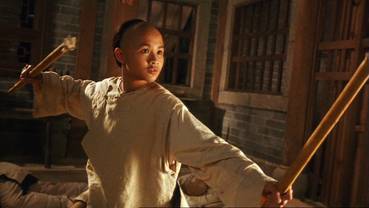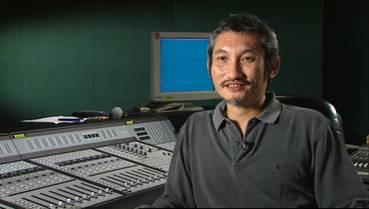|
When
Ang Lee's Crouching Tiger, Hidden Dragon
exploded into western cinemas five years ago, audiences and
critics were understandably excited by this new take on
the martial arts genre and the film's often dazzling action
choreography. For fans of martial arts cinema, however, this
was not such new ground. The Wuxia sub-genre, a mixture of
kung-fu, swordplay and fantasy, has its roots in Chinese
literature and first found cinematic form in the late 1960s,
most notably with King Hu's 1969 A Touch of Zen.
For a sizeable portion of the audience that flocked to Crouching Tiger, however, this was their
first exposure to it (hence the sometimes heard comment
in cinemas "How come they can run up the walls?").
As for the choreography – well, from this point on simply
having the name Yuen Woo-ping attached to your film
was seen as a badge of action prestige. But once again,
Yuen had been choreographing martial arts sequences since
1971, acting since 1965, and directing since 1978.
For martial arts movie devotees, the biggest surprise delivered
by Crouching Tiger was that it managed
to connect so effectively with a more mainstream international
audience where its predecessors had remained in the world
of the cult.

Made
seven years before the genre moved into the mainstream,
Iron Monkey can retrospectively be seen
as a work that marks a midway point between the kung-fu
films of the 70s and 80s and the elaborately shot and styled
Wuxia works that were soon to follow. The balletic wire-work,
gravity-defying leaps and quicker-than-the-eye fight choreography
were all pointers of things to come, but the obviously post-dubbed
dialogue and exaggerated sound effects are rooted firmly
in the heyday of the Shaw brothers and Raymond Chow, while
the comedic interludes acknowledge the influence and success
of Jackie Chan, Sammo Hung and their contemporaries.
The
plot and characters are certainly a little more sophisticated
than the innocent vs. evil genre favourite. In a 19th century Chinese
town, the kindly and skilled physician Dr. Yang has a secret
identity, that of Iron Monkey, a masked figure imbued with considerable
fighting skills who robs from the corrupt rich and redistributes
the wealth to the needy. Flustered officials are in the
process of rounding up anyone they think might be this Chinese Robin Hood, when into town strolls legendary fighter
Wong Kei-ying and his young son Wong Fei-hung*. Quickly finding themselves in conflict with some of the locals,
both are arrested and Wong is blackmailed into
hunting down Iron Monkey. Knowing nothing of his secret
identity, Wong almost immediately makes friends with Dr.
Yang, who then rescues Wong's son from jail and treats his
illness, which ony serves to strengthen their bond. They soon
find common ground in the shape of super-skilled bad guy
and fallen Shaolin Monk, Hiu Hing, whose King Kong Fist injures
Yang and presents a serious challenge for Wong. Just as
well, then, that Wong Junior and Yang's pretty assistant
(and girlfriend) Miss Orchid are also formidable fighters...
Although
constructed in part through editing and wire work (and occasionally very evident camera undercranking), the action
sequences, which are a kung fu film's raison d'être,
are very impressively and often inventively choreographed and staged,
with a variety of objects – from poles to pots to clothing
and umbrellas – employed as weapons that are juggled, spun,
thrust and hurled at opponents. All four leads get at least
one show-stopping action scene, and the climactic battle,
fought with the three protagonists balanced on top of flaming
bamboo poles, has already become part of genre legend, its wire-assisted leaps never detracting from the sheer spectacle
of the piece or the athletic abilities of the performers.
Surprisingly, though, the film's most quietly memorable
and imaginative sequence is not a fight scene at all, but
one in which Dr. Yang and Miss Orchid collect wind-blown papers
via a series of gracefully executed leaps and tumbles.

Lighting,
photography and production design provide a rich setting
for the action to play out within, and the martial arts
skills of stars Rongguang Yu (as Yang/Iron Monkey) and Donnie
Yen (as Wong) are well showcased, though it remains a mystery
why young Tsang Sze-Man (and yes, she's a girl) never appeared
in a another film after her impressive turn here as Wong's
son – if ever there looked to be a future martial arts star in
the making, it's here. But it's certainly Yuen Woo-ping's
show, with his choreographic skills investing every scene
with a visual dynamism, while his direction keeps things
moving at a pace that rarely allows the audience time to
wonder about the daffier aspects of the plot.
While
Ong-bak has re-grounded kung-fu films in
their wire-free roots, Iron Monkey remains a thoroughly engaging work that fully justifies
its position as a genre leading light. It may lack the epic
spectacle of Crouching Tiger and Hero,
but as unpretentious and sometimes spectacular fun, it's
a clear winner.
Framed
16:9 and anamorphically enhanced, this is another largely
fine transfer from Hong Kong Legends, with colour and contrast
very pleasing. Sharpness is very good, though edge enhancement
is detectable in places, especially areas of complex fine
detail (materials, some textures). Some compression artefacts
are visible in night skies, but are not intrusive.
There
is a choice of Cantonese soundtracks, though the only real
difference between the 5.1 and DTS is one of volume. Mainly
front weighted, there is some minor rear speaker activity
for atmos effects and music. The English dub was no doubt
prepared for the American release and is pretty horrible.
A
Bey Logan commentary is always
welcome, but here he's joined by the film's co-star Donnie
Yen which, ironically, provides considerably less information
on the film than you would normally find in Logan's solo
commentaries. This is mainly due to the conversational nature
of the track, with the two cheerily exchanging memories
and anecdotes that are often not screen specific and sometimes
have nothing to do with the film under discussion. That's
not to say it's a naff commentary, not by any means, as
the two have plenty of interesting and amusing stories to
tell. I certainly learned a few things, not least that
Logan was once employed briefly as Yen's bodyguard, a duty
he had to interrupt at one point to fulfil impromptu karaoke
duties. Particularly interesting is Yen's views on
the wire assisted aerial capabilities of characters in martial
arts movies – the further back in time the setting, he reasons,
the higher they can leap, and if you go back far enough
they can actually fly.
A
rare inclusion has selected sequences from the above commentary
presented visually as A Classic Re-Visited
(21:03), with video footage of Logan and Yen recording their
comments playing side-by-side with the film sequence under
discussion. This is of some interest if only to watch something
you usually only get to hear, but provides little information
that could not be gleaned from the commentary proper, save
for Yen's lightning-speed punch to Logan's face at the end
(he missed).
The
rest of the extras are on disk 2.

The
Interview Gallery contains interviews
with four of the film's key figures. Guiding
Light (24:36) is a chat with the film's
producer and a genre god, Tsui Hark, who discusses the genesis
of the Once Upon a Time in China series,
his work on these films with Yuen Woo-ping, and the development
of the Wong Kei-Ying character. He also talks about Iron
Monkey's initial box office failure and its eventual
more widespread success. Conducted in English and anamorphic
widescreen, Hark is a consistently fascinating talker, which
just adds to his genre status as The Man. In Shadow
Warrior (26:24) leading man Yu Rong-kwong
talks about his stage and film career, from Peking Opera
to kung-fu cinema, for which he had to learn the required
fighting skills. He stresses the importance of Peking Opera
training and effectively deconstructs the practicality of
modern cinematic kung fu (the somersaults and jumps are
for show), covering aspects of Iron Monkey
in some detail. The interview is in Chinese with English
subtitles. In Bewitched (25:21),
supporting actor Li Fai (she plays Witch) talks about her
martial arts training, her film career and her role in the
film. This interview is in Chinese and subtitled in English.
Finally in Role Reversal (19:59),
Tsang Sze-man looks back at her role as the young
Wong Fei-hung, her only stint at film. She talks about how she landed her part in
the film ("By mistake, I think") and about her
work with the actors and the director, as well as the experience
of playing such a role at a young age. Just why she never
made another film remains something of a mystery, however.
Promotional Archive features an Animated
Production Photo Gallery (2:45), which is
not exactly animated in the true sense of the word, just
some rostrum camera moves over a selection of production
photos, set to music from the film. The Original
Theatrical Trailer (4:45) may run for nearly
five minutes, but over a minute of that is taken up with
company logos. The UK Promotional Trailer
(2:00) gets straight down to business and is in spanking
shape, though voiced-over by Trailer Voice Man. The UK
Platinum Campaign Trailer (2:28) is virtually
identical to the promotional trailer, complete with that
voice-over, but with some added stuff about the DVD. The
UK Campaign TV Spot (0:35) includes
promotion for the VHS release (remember that?).
There are four Featurettes, though
the first two are pretty much identical in style and structure
to those found in the Interviews section and are essentially
more of the same. They kick off with A Dragon
Re-Born (19:36), in which Donnie Yen looks
back at his role in the film and his interpretation of a
character that already had a genre history. The interview
is in English, and sunglasses, and includes footage of a
promotional photoshoot, at which Yen waxes lyrical about
the influence of Chinese martial arts cinema on rap music. In Iron Fist
(16:01), action director Yuen Cheung-yan traces his martial
arts and movie experience, from his time with Beijing Opera
to his work on this film. This is in Chinese with English
subtitles. Shadow Boxing (8:11)
sees top stuntman Alex Yip demonstrating some fight choreography
and stunt work against a wall of mirrors, making it virtually
impossible for the crew to stay out of shot. Rounding this
section off is Floorshow, a nice
inclusion that consists of footage of Li Fai and Tsang Sze-man
competing at the 2003 Wushu Championships in Macau, glimpses
of which were included in their interviews. This is broken
up into two sections, Classical Sword Forms
(9:10) and Tai Chi Form (6:39).
Last
of all, Information Library has notes on the film and detailed
biographies for Donnie Yen, Yu Rong-kwong, Tsui Hark and
Yuen Woo-ping.
A
must for kung-fu cinema fans and a good way for those who have
come to the genre via the likes of Crouching Tiger
to really get their generic feet wet, this Platinum Edition
release showcases the film very nicely, and as part of Hong
Kong Legends' upcoming 'Epic Action' box set is an absolute
steal, packaged as it is with Wing
Chun and Tai Chi Boxer. If
you haven't already picked this up then now could be the
time.
|